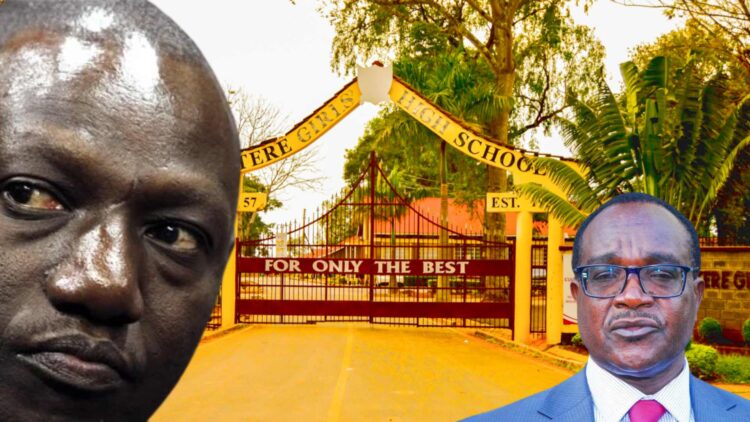Echoes of War: Butere Girls’ Play Revives Memories of Moi-Era Free Speech Suppression.
On Thursday, students at Butere Girls’ High School refused to perform their highly acclaimed play, Echoes of War, at the National Drama Festival.
The play, written by Cleophas Malala, former Secretary-General of the UDA, was not staged due to a lack of necessary props and the absence of the directors. Malala, who had been arrested and held at Elburgon police station, also condemned the heavy police presence at the festival, which many considered stifling.
This incident echoes the past struggles of prominent playwrights like Ngũgĩ wa Thiong’o, who used theatre to challenge political regimes. Ngũgĩ, who became famous for his works in the 1960s and 1970s, continues to serve as a symbol of the power of theatre in expressing dissent.
Plays, such as Ngaahika Ndeenda (I Will Marry When I Want), written with the late Ngugi wa Mirii, were instrumental in critiquing the first Kenyan government under Jomo Kenyatta. The Kenyan government, in turn, reacted harshly, banning the play and imprisoning Ngũgĩ without trial.
Ngũgĩ’s Arrest and Impact:
Ngũgĩ’s arrest in 1977 for staging Ngaahika Ndeenda marked a turning point in his career. His time in detention brought attention to Kenya’s human rights abuses and solidified his commitment to political activism.
Released in 1978 after Jomo Kenyatta’s death, Ngũgĩ was denied the opportunity to return to the University of Nairobi and eventually went into exile in 1982. Despite returning to Kenya briefly in 2004, his visit was marred by an attack on him and his wife. His works, though influential, remained largely absent from Kenyan schools for decades.
When Daniel arap Moi took power in 1978, political dissent faced severe repression. Ngũgĩ’s works, especially Caitani Mutharaba-ini (Devil on the Cross) and his prison memoir Detained, continued to challenge the government.
During a 1982 tour of London, Ngũgĩ received a warning from the Nyayo regime, which led him to avoid returning to Kenya until Moi’s departure from power.
The Moi era saw a further clampdown on creative works that criticized the government. Theatre, once a vibrant form of expression, became stifled as many playwrights fled into exile, leaving the country’s creative scene diminished.
Those who remained in Kenya turned to more symbolic methods of conveying political messages, adapting their works to avoid direct confrontation with the regime.
The Decline of Theatre in Kenya:
By the late years of Jomo Kenyatta’s rule, themes of social discontent were prominent in theatre, reflecting the worsening political climate. However, the oppressive atmosphere during Moi’s tenure made it increasingly difficult for playwrights to engage in bold political commentary.
Many artists left the country, disrupting the social and cultural contexts that had shaped their works. Those who stayed behind often resorted to symbolic writing, hiding political messages under layers of metaphor and allegory.
Echoes of War, the controversial play by Butere Girls, explores themes of generational conflict, social media’s role in fighting for justice, and the clash between digital innovation and traditional values.
Set in a fictitious Arabic society, it tells the story of intergenerational mistrust and conflict, calling attention to the tensions between modernity and cultural conservatism.
The play’s dialogue reflects the frustrations of a younger generation, often referred to as Gen Z, who feel disconnected from the older generation’s rigid norms.
One powerful line in the play criticizes societal expectations: the younger generation expresses frustration with older authorities who refuse to understand them. This conflict, however, reaches a resolution at the end of the play when the two opposing groups come to an understanding, realizing the futility of war and the importance of unity.
The Legal Battle and Public Outcry:
Although the play had been largely unnoticed until April 3, 2025, when the High Court intervened, the controversy surrounding it quickly escalated.
The principal of Butere Girls’ High School had initially blocked the students from participating in the national festival, but the court ordered the recall of the 50 drama students.
Chaotic scenes unfolded as journalists were assaulted, and the students’ safety was compromised. Malala, in response, criticized the police’s heavy-handed approach, which he saw as an attempt to suppress free expression.
The protests surrounding Echoes of War serve as a reminder of Kenya’s evolving political landscape, where protests and artistic expressions are increasingly used to voice dissent.
The nationwide protests of 2024, which involved police violence, killings, and calls for political change, have drawn parallels to the era of Moi’s rule. Despite the challenges, Kenya’s current constitution and media freedoms reflect a vastly different political environment compared to the repressive years of Moi’s presidency.
Read Also: Echoes of Shame: Government vs. Teenage Artistry at National Drama Festival
Conclusion:
While the suppression of creative voices in Kenya’s theatre may seem like an attempt to silence dissent, history has shown that artistic expression can find new avenues for resistance.
Music, plays, and other creative forms of protest continue to offer an important platform for challenging the status quo. Listening to the concerns of the creative sector, rather than suppressing them, may be the key to addressing political dissent in a meaningful and productive way.
Echoes of War: Butere Girls’ Play Revives Memories of Moi-Era Free Speech Suppression.



Discussion about this post